#indigeneity
Text
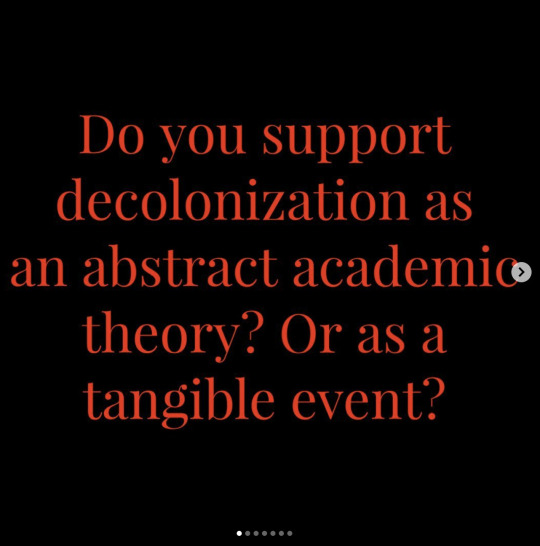
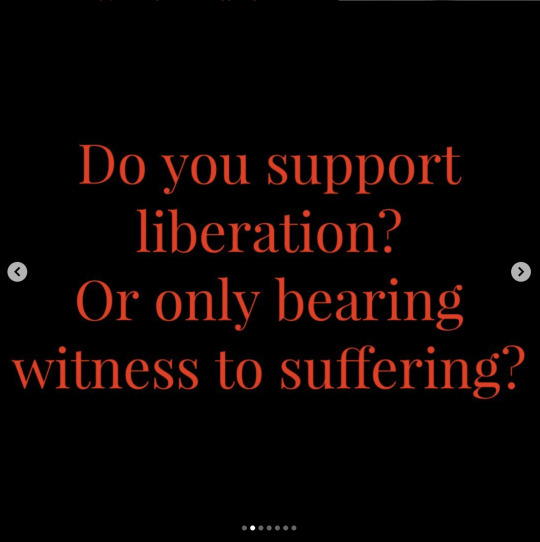

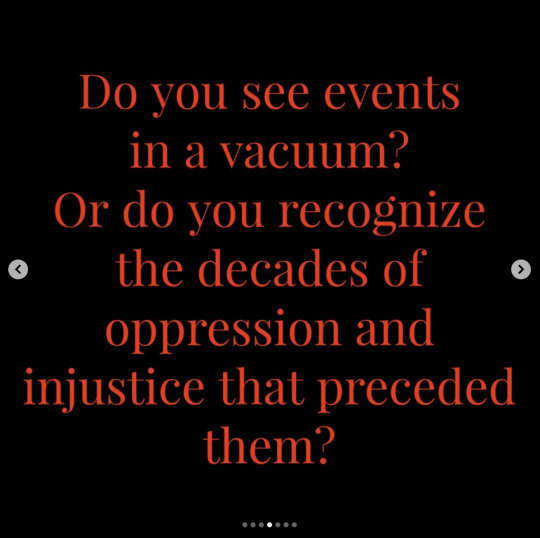

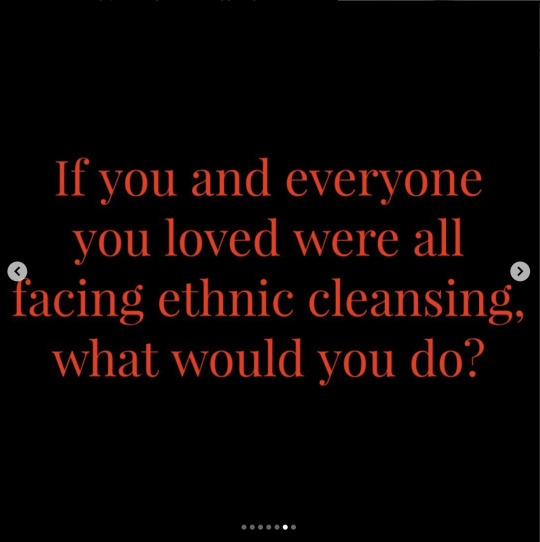
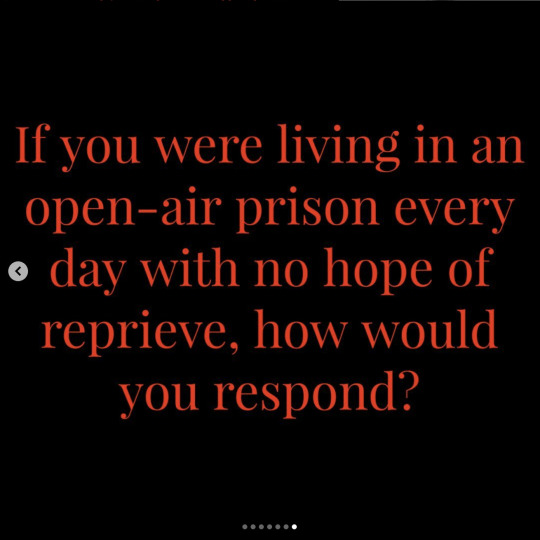
"Questions to keep in mind with the coming news cycle."
Reposting this from @ savesheikhjarrahnow on ig.
Prepare yourself for a torrent of pro-Zionist colonial lies and obfuscations in the Western news. Do what you can to counteract it. Palestine needs your help, now more than ever.
From the river to the sea, Palestine will be free!!! 🇵🇸🇵🇸🇵🇸
#decolonisation#decolonization#decolonialism#decolonize#palestine#free palestine#palestinian resistance#indigenous#zionism#indigeneity#landback#colonialism
2K notes
·
View notes
Text
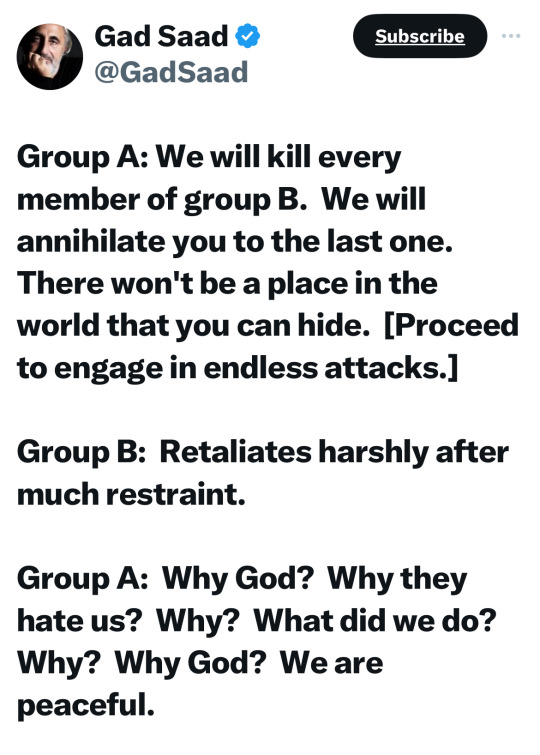
I truly adore Gad Saad.
#israel#secular-jew#jewish#judaism#israeli#jerusalem#diaspora#secular jew#secularjew#islam#indigenous#indigeneity#gad saad#antisemitism#Hamas#Gaza#Gazans#never forget#never again#no ceasefire#israel hamas war#hamas massacre#al shabab#Al asqa brigades#hezbollah#Taliban#Isis#hamas is isis#the religion of peace#the religion of pieces
333 notes
·
View notes
Text
"Rule Britannia is out of bounds" - How England invented Great Britain
("Rule Britannia is out of bounds"- Life on Mars, David Bowie, 1971)
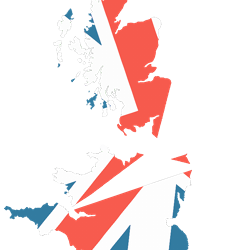
As promised, here is a more in-depth exploration of Wales' relationship to indigeneity or colonised status. And how England created the (political) concept of Great Britain when it formally annexed Wales in 1542. This is a long post but I will try and be brief where possible to do so. I graduated with a degree in Celtic Studies last year from Aberystwyth University so it's time to put that to use.
In my last post, I went over the groundwork for this conversation - so if you haven't read that one yet I strongly suggest you read that one first then come back to this one. In that first post, I establish the stickiness in claiming or applying the status of colonised onto the modern nation and people of Wales. I also explore how claims of indigeneity (intended to legitimise Welsh nativism through dubious claims of descent from the Iron Age Britons) are weaponised in modern political contexts.
With all that said - how does one categorise the suffering of Wales/its culture and language without straying into the language of the colonised?
Early Medieval English Imperial desire for Wales:
Very often, you will hear people make the claim that Wales was 'England's first colony' and that the other nations bordering England were guinea pigs for Britain's later colonial empire. My previous writing on this topic has established the difficulty in applying colonised as a term to Wales and its context. Which leads to the question of what do we describe it as instead?
For this, we need to make a distinction between colonialism and imperialism.
The two concepts are very similar (and do overlap slightly) but they have crucial differences which allow us to be more precise and succinct with our wording which aids both communication of the subject and quells misunderstanding through language which doesn't fit the situation.
Put simply, Imperialism is when one country, people or nation desires to extend power over another (usually a close-by or neighbouring territory) - especially (but not solely) through the means of expansionism.
Colonialism is also when a country, people or nation wants to extend power over another - but primarily through invasion and typically (but not always) against territories that are further afield and not immediate neighbours).
A lot of the way in which we view early British history in Wales is tinged with a kind of exceptionalism for what happened between England and Wales. Very often, what was done is framed as uniquely terrible for the time and held up as a poster child for the unique evil of England's expansionist desires. Yet all over Europe at the same time this was happening - other European nations and peoples were engaging in the same subjugator-subjugatee relationship. The exceptionalism present in framing Wales as uniquely suffering in this period is, unfortunately, borne out of the same British imperial culture which was thrust upon it and has become irrevocably entwined with culturally. It is a kind of British arrogance (which ironically crops up in anti-British arguments in Welsh independence activism) which presupposes nobody could have suffered the same or worse than they have, which demands the active ignorance of other, contemporary examples of that which they claim to oppose.
Wales was the first victim of English (later British) Imperialism - not its first colonial victim.
The build-up to and annexation of Wales by England:
Wales was annexed twice - once before the age of states and once shortly before that age dawned. The concept of states (as in, sovereign countries) didn't really exist until after the Treaties of Westphalia (1648). In which the concept of non-interference in the religious affairs of other countries (and other domestic affairs) was established and international relations was born. This is relevant to Wales' situation - as what England did to Wales happened long before the age of states began.
There was the Conquest of Wales by Edward I between 1277 and 1283. (Before that, the Norman Conquest of Wales by 1081). (However, the latter being conducted by the Normans is not necessarily equatable to the actions of England the country, which itself had only just been invaded by the Normans). And then the Laws in Wales Acts which formally incorporated Wales into the realm of the Kingdom of England in 1542.
The Conquest of Wales by Edward I overran the territories of the last Prince of Wales (from the Welsh monarchic tradition), Llywelyn the Last and divided the territories into Welsh Principalities and Marcher Lordships. This setup remained until 1542, when Henry VIII passed the Laws in Wales Acts and formally annexed Wales and made it (in all the legal senses) a part of England.
By the time international relations was in its infancy (i.e. shortly after the Peace of Westphalia) Wales had been absorbed into England for just over 100 years. The relevancy of this is that Westphalia had been about religious liberty - Henry VIII's incorporation of Wales into the Kingdom of England was partly informed by religion. Henry VIII had just broken away from Rome and established the Protestant Church of England, whereas Wales was still largely Catholic. The Laws in Wales Acts also replaced the language of the courts in Wales with English, cutting off monolingual Welsh speakers from legal representation. The language of worship became English instead of Latin. Wales was culturally assimilated into England over a long period of time. And that meant ensuring Wales followed the 'correct' religion and spoke the 'correct' language. After the Peace of Westphalia, these actions by Henry VIII to bend Wales to his new religion and to assimilate Wales into England would have been in poor taste or decried in light of the new Westphalian system that was developing in Europe. Alas, these events took place before then and temporally speaking, Wales was locked out of this recourse.
By contrast, Scotland was unified with England into the Kingdom of Great Britain in 1707 (after the Peace of Westphalia). England committed numerous acts of cultural erosion and destruction against Wales and Scotland at this time - but its Union with Scotland differs to that with Wales. Wales was incorporated into England, whereas Scotland was 'invited' to join a union between England (which then included Wales) and itself. Simplifying it greatly - like a marriage proposal in which the two spouses are *supposed* to be equals. After the Act of Union with Scotland, the whole island of Great Britain was 'unified' and thus the Kingdom of Great Britain was formed from two states - England (inc. Wales) and Scotland into one state.
Welsh Nationalism and Nationhood as separate from Statehood:
Wales and Scotland were the victims of English imperialism in many similar, but also many different ways.
Wales, having never been a 'state' was unable to acquire this status since it had long been incorporated into England by the time the concept of states had developed. Wales was unlucky in this way, because other nations on this island such as Scotland had managed to establish themselves long enough to survive into the age of states and thus became one. Because of this, Welsh nationalism cannot look to an era in which it was a free state because that did not happen. Instead, Welsh nationalism very often looks back with rose-tinted spectacles to Wales prior to Edward I's conquest and/or prior to Henry VIII's Laws in Wales Acts.
But nationhood and statehood are not the same thing - and it is the conflation of these two concepts (like the conflation of colonialism and imperialism) which has led to much of the confusion on these topics. Nationhood is acquired by a group of people who share several of these things: a common language, history, culture and (usually) territory. Not all of these things are required, but most nations have all or almost all of these qualities. Wales has a language (Welsh), a common history, culture and territory (Wales). Statehood is acquired by an association of people who have most or all of these things: formal institutions of government, laws, permanent territorial boundaries and sovereignty. Wales before 1283 very loosely had government and laws (monarchy and Laws of Hywel Dda) but had no permanent territory due to the conquest and lost some sovereignty in 1283 and total sovereignty in 1542.
Even if Wales had met all the criteria for a state in 1283, it would not have been eligible to become one - no nation in the world was able to do that yet because the concept (or proto-concept) for it would only be invented in 1648. Even England did not qualify for state status yet. Put simply, Wales got very unlucky with history and geography in such a way which prevented it from having a historical statehood post-1648 like neighbouring England and Scotland.
Naturally, when Welsh nationalism attempts to recall a past in which it was a 'state' - it is always an imagined and romanticised history. A fantasied history which generates ideas of the persecuted 'indigenous' Cymro where it shouldn't really be (in all seriousness, the injustices inflicted upon Wales by England are enough - extra additional injustices reliant upon a claim to to 'nativeness' do not need to be invented in order to be taken seriously). In the modern world, claims of nativeness in a European context are fraught, misguided, in poor taste and often copy the homework of the indigenous peoples those same European powers marginalised or colonised. In the modern world, a white Welshman claiming indigeneity is doing so in a postcolonial world and there really is no escaping that. Succinctly - the Welsh nationalist who relies upon a created sense of nativeness can only do so by drawing upon the work of marginalised native peoples living in parts of the world formerly colonised by Great Britain. To claim native status as a Welshman is to misunderstand and misappropriate history while wielding the language of the genuinely colonised while contributing nothing to it. It is purely extractive and a slap in the face of non-European native peoples everywhere. The pining for this return* to a prior point in Wales' history where it was a fully functional, sovereign nation populated only by 'native' or 'indigenous' Cymry is an alarming and ahistorical fantasy that all too easily slides into ethnonationalism and nativism -ancient or modern.
(*the choice of the word 'return' here is no accident - the desire to 'return' is inextricably linked to the alt-right dogwhistle 'retvrn' and it it is frighteningly common to see elements of that subculture crop up in Welsh nationalist calls to return to a point in Wales' history where it was 'sovreign'.)
Welsh nationalism which isn't vigilant to this kind of thinking very often will find itself arguing blatant untruths. For example, on the milder side of fake history, I've come across Welsh nationalist groups claiming symbolism from Owain ap Gruffydd's coat of arms - despite the fact he lived before the age of heraldry and he never used these arms because they were attributed to him later.
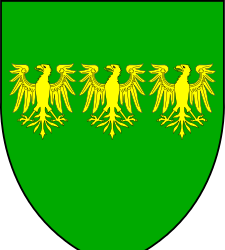
What next for Wales after 1542?:
Since Wales was fully and formally incorporated into the Kingdom of England by 1542, English colonisation of the Americas prior to 1707 naturally included Welsh colonists as well as English colonists. After 1707 Scots joined in with the now British colonisation of the Americas (both as/for/on the side of the Brits and as Scots fleeing Scotland after the Act of Union decimated Scottish Gaelic traditional culture). The Welsh, on the other hand, were more intimately involved with the colonisation of the Americas before that.
Though England spearheaded its colonisation of the Americas, Wales was not an unwilling participant dragged along by its association with and incorporation into England - Welsh colonisation, like Scottish colonisation, was often motivated by religious or cultural persecution - of which colonisation of another land was a possible solution to cultural loss in their home countries. Pennsylvania was settled by many Welsh Quakers and the idea of a Welsh Tract was floated to the Welsh settlers in 1684. The idea was to create a county which would operate in the Welsh language and serve as a vehicle for the preservation of the Welsh language. This attempt was not as successful as Wales' colony in Patagonia, Argentina in which native populations there were displaced at the behest of the Argentinian government - who needed the land settled and cleared. Welsh colonists took up this mantle and created Y Wladfa colony there in 1865.
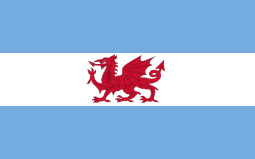
Returning to the 17th Century - Welsh people were active colonists in the Americas during this time - motivated by saving the Welsh language and freedom of religion (especially the developing Nonconformist denominations of Protestant Christianity developing at this time). It was not so much that England was forcing Wales to participate in its colonialism, but that Wales has its own wants and ends for colonialism and was motivated entirely on its own grounds.
Back at home, Wales was still hard-done-by due to England - but two things can be true at once. Wales was a victim of English imperialism, but was also a perpetrator itself of colonial violence against Native Americans. England was no such victim of imperialism of any kind and the power dynamic for England had always been one rooted in absolute expansionism.
Summary and Conclusion:
With all of that said - if you were to ask point blank if I feel it is appropriate or okay for Wales to claim it was colonised by England and that Welsh people are in some way, more indigenous to the island than any other people living here - my answer would be no, I don't think it's okay.
I can't stop people from thinking otherwise, but I can reason that perhaps we shouldn't appropriate the struggles of people marginalised by the very nation we are talking about in order to craft a victimhood which is entirely unnecessary. Wales was a victim of English imperialism - but Wales was also an active colonising European nation. In the modern world, people are thankfully more willing to listen to the wants and needs of victims of colonialism - particularly victims of British colonialism in the Americas, Oceania and Asia. But I would warn against Welsh nationalism which seeks to capitalise on that increase in indigenous visibility in order to add legitimacy to itself (necessitating the crafting of an 'indigenous' narrative which did not exist there before). We live in the modern world where indigenous peoples are being taken more seriously than in centuries past - but that does not mean the only peoples hard-done by being taken seriously are colonised indigenous populations.
I believe it comes from a deep seated insecurity within Wales in which it is not uncommon to feel like Wales is being left behind because of all of this advancement. And this insecurity manifests as rejection of anything not obviously Welsh or demonstrably 'home-grown'. It's the national equivalent of a survival mechanism - but this is detrimental not only to the cause of Welsh nationalism, but to Wales itself. I've had people say to me (and I have read in historical sources from the last 100 years in Welsh) that the LGBTQ+ movement is actually an English invention created to erode Welsh traditional culture. Or variations on that rhetoric in which it is immigrants or other minorities which are made into this boogeyman come to destroy Wales and all Welsh ways of life. And it is so demonstrably not true but also bitter to see from the hearts and minds of my fellow Welsh speakers/Welsh people. Who have been hurt so much by the historical erosion of their culture that they confuse non-threats for threats and can only resolve to obtain some more legitimacy by appropriating the language of nativeness and colonisation in this ever changing world which, right now, is listening to native peoples for once.
It's difficult to put into words, even with all of the background knowledge above - but Wales is valuable and legitimate all on its own and doesn't need to rely upon things which isn't serving it - like ethnonationalism and nativism.
I want to live in a Wales which is uncompromising not only in its own fight for recognition and respect - but for other nations and peoples' fights for the same as well. I want to live in an independent Wales which is an ally to all those who share Wales' struggle and a Wales which rights the wrongs of its past without hesitation or compromise.
Would you rather a Wales for the few or a Wales for all who call it home?
#cymraeg#welsh#wales#cymru#ethnonationalism#cymblr#nativism#indigenous#native#indigeneity#nativeness#tags for relevance#celtic nations#celticist#I know there's so many more things I could say or could add but this post is so long already#granted it's evidence this conversation sorely needs to happen#so if you have any additions or thoughts please reblog or reply in the tags#and reblog this post so that more people have a chance to read it#diolch pawb#long post
133 notes
·
View notes
Text
I'm not jewish, but I've been thinking about the claim that all jewish people can claim indigeneity to Israel/the levant because judaism originated from the area and traditional jewish prayers are directed towards Israel etc.
But this view of indigeneity feels a bit reductive to me. There's more to a culture than language and religion, and the two doesn't compare to actual material culture or relationship to land. In my mind, I ask myself how westernized jewish ppl from Europe and North America can claim to be indigenous to a place they and their close ancestors haven't stepped foot in for generations.
The population that lived in the region for centuries and farmed the land should be considered indigenous but I doubt the same can be said for the entire jewish diaspora who've developed very different material cultures due to where they live.
I've seen the statement by a zionist on tumblr that among other things such as holidays, prayers and language*, "the clothes we wear and the food we eat are all inherently tied to the land"*.
I doubt those last parts, because theres no way that fur-hats/shtreimels which are worn by orthodox jewish men couldve been developed in the levant. The Palestinian thawb and kuffiye are examples of traditional clothing worn by the native people and actually adapted to the climate of the region and carry with them symbols of cultural significance.
I felt nervous writing this, as I know its a controversial position to hold. Im not saying that no jewish person is native to the Levant, just that I doubt that religion and language alone makes someone "indigenous".
49 notes
·
View notes
Text
‘Extraction and assimilation go together. Colonialism and capitalism are based on extracting and assimilating. My land is seen as a resource. My relatives in the plant and animal worlds are seen as resources. My culture and knowledge is a resource. My body is a resource and my children are a resource because they are the potential to grow, maintain, and uphold the extraction-assimilation system. The act of extraction removes all of the relationships that give whatever is being extracted meaning. Extracting is taking. Actually, extracting is stealing—it is taking without consent, without thought, care or even knowledge of the impacts that extraction has on the other living things in that environment. That’s always been a part of colonialism and conquest. Colonialism has always extracted the indigenous—extraction of indigenous knowledge, indigenous women, indigenous peoples . . . Children from parents. Children from families. Children from the land. Children from our political system and our system of governance. Children—our most precious gift. In this kind of thinking, every part of our culture that is seemingly useful to the extractivist mindset gets extracted. The canoe, the kayak, any technology that we had that was useful was extracted and assimilated into the culture of the settlers without regard for the people and the knowledge that created it.’
- Leanne Betasamosake Simpson
In conversation with Naomi Klein
405 notes
·
View notes
Text
Francis Spufford’s “Cahokia Jazz”

Tomorrow (December 5), I'm at Flyleaf Books in Chapel Hill, NC, with my new solarpunk novel The Lost Cause, which 350.org's Bill McKibben called "The first great YIMBY novel: perceptive, scientifically sound, and extraordinarily hopeful."

Francis Spufford's Cahokia Jazz is a fucking banger: it's a taut, unguessable whuddunit, painted in ultrablack noir, set in an alternate Jazz Age in a world where indigenous people never ceded most the west to the USA. It's got gorgeously described jazz music, a richly realized modern indigenous society, and a spectacular romance. It's amazing:
https://www.simonandschuster.com/books/Cahokia-Jazz/Francis-Spufford/9781668025451
Cahokia is the capital city of Deseret, a majority Catholic, majority indigenous state at the western frontier of the USA. It swirls with industry, wealth, and racial politics, serving as both a refuge from Jim Crow and a hive of Klan activity. Joe Barrow is new in town, a veteran who survived the trenches of WWI and moved to Cahokia with his army buddy, Phineas Drummond, where they both quickly rose through the police ranks to become detectives.
We meet Joe and Phin on a frigid government building rooftop in the predawn night, attending a grisly murder. Someone has laid out a man across a skylight, cut his throat, split his chest open, and excised his heart. This Aztec-inspired killing points at Cahokian indigenous independence gangs, some of whom embrace an apocryphal tale of being descended from Mesoamerican conquerors in the distant past. That makes this more than a mere ugly killing – it's a political flashpoint.
The Klan insists that Cahokia's system of communal land ownership is a form of communism (Russia never ceded Alaska in this world, so the USSR is now extending tendrils across the Bering Strait). They also insist that Cahokians' reverence for the Sun and the Moon – indigenous royals who have formally ceded power to elected leaders – makes them a threat to democracy. Finally, the Cahokians' fusion of Catholocism with traditional faith makes the spritually suspect. A rooftop blood-sacrifice could cause simmering political tension to boil over, and for ever white oligarch drooling at the thought of enclosing the shared land of Deseret, there are a thousand useful idiots in white hoods.
Joe and Phin now have to solve the murder – before the city explodes. But Phin seems more interested in pinning the case on an Indian – any Indian – than he is on solving the murder. And Joe – an indigenous orphan who has neither the language nor the culture that the Cahokians expect him to have – is reappraising his long habit of deferring to Phin.
This is the setup for a delicious whodunnit with a large helping of what if…? but Spufford doesn't stop there. Joe, you see, is a jazz pianist, and his old bandmates are back in town, and one thing leads to another and before you know it he's sitting in with them at a speakeasy. This gives Spufford a chance to roll out some of the most evocative, delicious descriptions of jazz since Doctorow's Ragtime (no relation):
https://www.penguinrandomhouse.ca/books/41529/ragtime-by-e-l-doctorow/9780812978186
It's not just the jazz. This is a book that fires on every cylinder: there's brilliant melee (and a major battle set-piece that's stunning), a love storyline, gunplay, and a murder mystery that kept me guessing right to the end. There's fakeouts and comeuppances, bravery and treachery, and above all, a sense of possibility.
Most of what I know about Cahokia – and the giant mounds it left behind near St Louis – I learned from David Graeber and David Wengrow's brilliant work of heterodox history, The Dawn of Everything:
https://pluralistic.net/2022/03/08/three-freedoms/#anti-fatalism
Graeber and Wengrow's project is to make us reassess the blank spaces in our historical record, the ways of living that we have merely guessed at, based on fragments and suppositions. They point out that these inferences are vastly overdetermined, and that there are many other guesses that fit the facts equally well, or even better. This is a powerful message, one that insists that history – and thus the future – is contingent and up for grabs. We don't have to live the way we do, and we haven't always lived this way. We might live differently in the future.
In evoking a teeming, indigenous metropolis, conjured out of minor historical divergences, Spufford follows Graeber and Wengrow in cracking apart inevitability and letting all the captive possibility flow out. The fact that he does this in a first rate novel makes the accomplishment doubly impressive – and enjoyable.

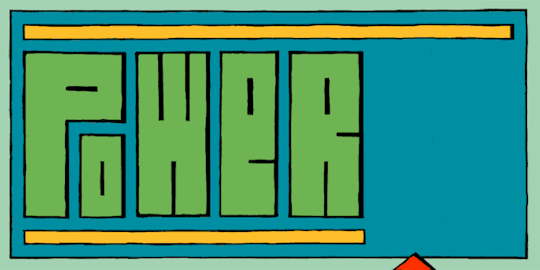
It's EFF's Power Up Your Donation Week: this week, donations to the Electronic Frontier Foundation are matched 1:1, meaning your money goes twice as far. I've worked with EFF for 22 years now and I have always been - and remain - a major donor, because I've seen firsthand how effective, responsible and brilliant this organization is. Please join me in helping EFF continue its work!

If you'd like an essay-formatted version of this post to read or share, here's a link to it on pluralistic.net, my surveillance-free, ad-free, tracker-free blog:
https://pluralistic.net/2023/12/04/cahokia/#the-sun-and-the-moon
#pluralistic#alternate history#science fiction#indigeneity#cahokia#frances spufford#books#reviews#gift guide#jazz#music
93 notes
·
View notes
Note
Hope this comes as a good faith question.
Jewish people have a huge history to the land of Palestine with ancient artifacts as old as 4K years. While a lot of Israelis are jewish and settlers, there are many in Palestine that have stayed there.
What’s the difference between an indigineous jew and a settler jew if they’re both part of the same ethnoreligious group? I’d appreciate anyone chiming in to help answer.
That's a good question!
Settlers destroy the earth and people in the name of claiming land.
Indigenous people dont. Indigenous people defend themselves from those people.
•••
Hamas is calling for a peaceful one state solution which would value all people equally, there would be no Reason to keep the everyone divided if they were equals, especially as how the holy history in the region has been shared by people of many religions for many ages.
Natives from Turtle Island (the so called USA) are also in a similar position because our first instinct was to be kind and show the pilgrims how to live on this land. We are still advocating for our own "one state" solution: Landback where we too will all be considered as equals with equal rights to exist.
Indigenous people want the right to freely be indigenous again.
Settlers want something to conquer, own, and use up. And they don't see a problem with it. They're simple that way. A lot of time they'll even justify the problems do have by telling themselves the people they're hurting deserve those problems anyway.
Indigenous Jewish ppl will have connections with the land, they'll hear their own heart breaking in when olive trees crack in a fire. When they hear Netanyahu is going to salt the earth and make it so nothing, not even insects, can live there they too will be horrified.
They hear about about how Gazans have no water and they who know that there is no life without water would fight for the Palestinian right to have it.
They'd be trying to dismantle their own government as it's only using the Jewish identity to hide behind as it commits genocide and brings settler colonialist violence into the new year.
I think truly indigenous Jewish ppl are horrified about the things being done in their name. I think they'd be horrified to see what they're going to be inheriting and gifted.
Indigenous is something you are. There is no modifier or blood measure for it.
You are indigenous or you're not. It's a way of being, not a birthright you can prove and that's why colonizers hate indigenous people so much and why they need to create regulations for it like blood quantum or the Nuremberg laws.
You can't fake indigeneity so they can't colonize it. That's why they colonize our land instead by razing it the ground.
Which is why how long you are somewhere doesn't matter either and it's why nobody cares when Zionists say they've been there for thousands of years and that makes it theirs.
Natives don't salt the earth they love.
Colonizers do.
It really is as simple as that.
Anyone, including Jewish people can be indigenous. (And likewise there are many Jewish native Americans)
But settlers? Settlers by their very nature can not be indigenous.
And fortunately Settler is neither a race or ethnic group. It's an action. A choice. So it's not something you are bound to forever.
All this to say the only difference between a settler and an indigenous Jew is whether they've chosen to liberate or subjugate.
If any Jewish Native ppl or Native Jewish ppl wanna chip in to add/correct anything then please do!!!!
#asked#answered#settler colonialism#indigeneity#also being judaism is a closed practice and i try to resoect that so if i said something i shouldn't have or thats inconsistent w/Torah#or something like that then lmk cuz I wouldnt know
60 notes
·
View notes
Text
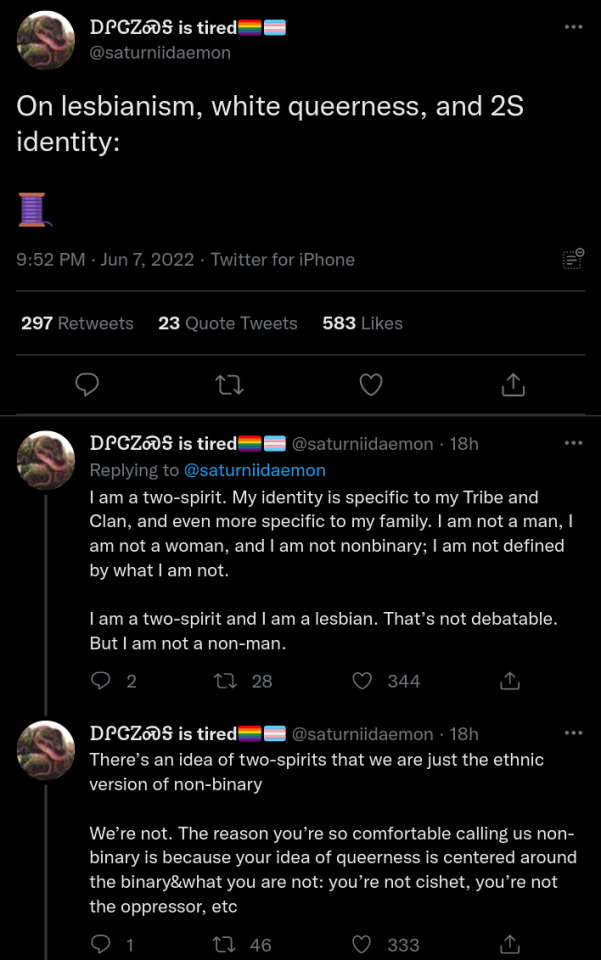
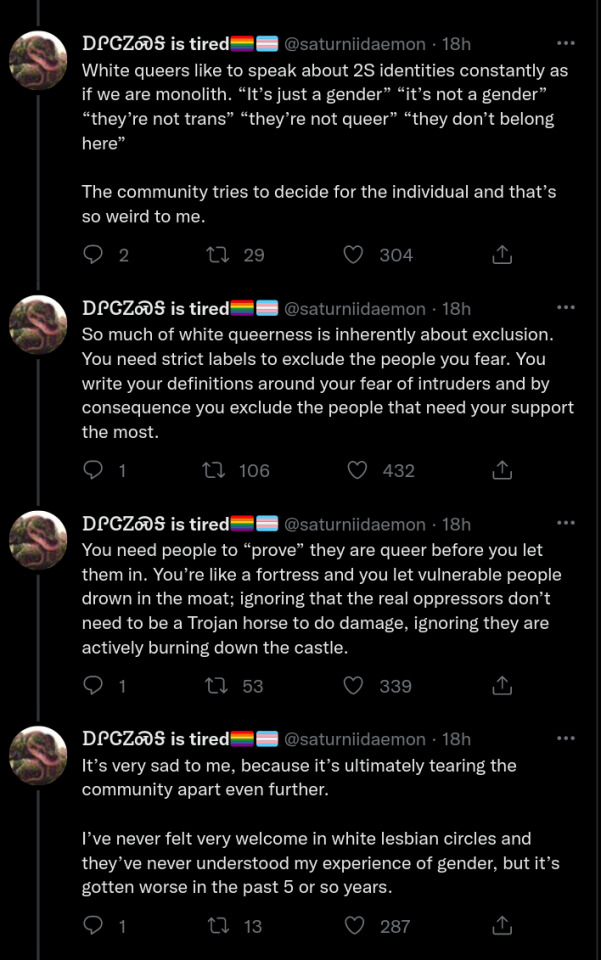
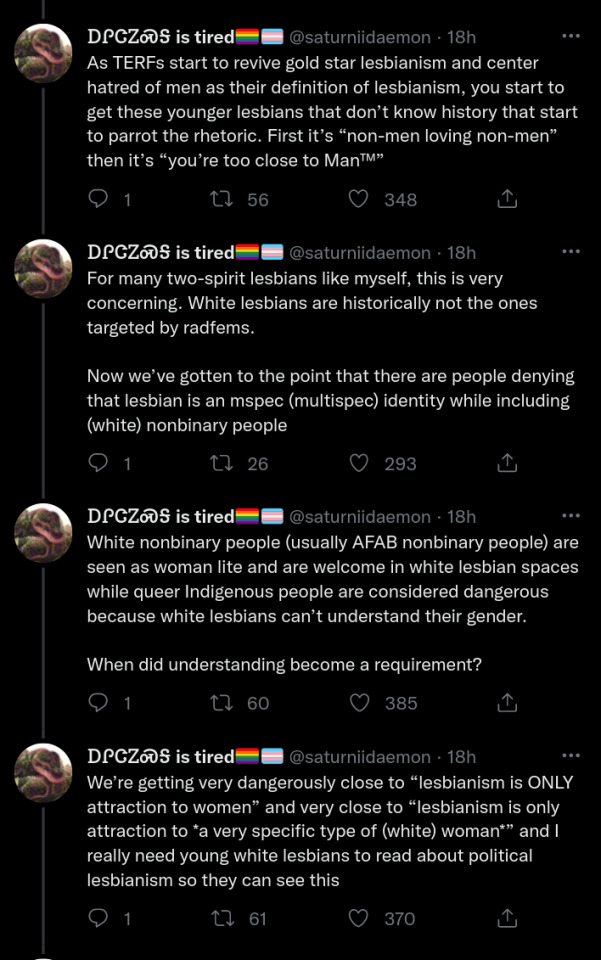


So apparently it’s that time of year again where I have to post about this.
On lesbianism, white queerness, and 2S identity
Text below readmore
I am a two-spirit. My identity is specific to my Tribe and Clan, and even more specific to my family. I am not a man, I am not a woman, and I am not nonbinary; I am not defined by what I am not.
I am a two-spirit and I am a lesbian. That's not debatable.
But I am not a non-man.
There's an idea of two-spirits that we are just the ethnic version of non-binary
We're not. The reason you're so comfortable calling us nonbinary is because your idea of queerness is centered around the binary&what you are not: you're not cishet, you're not the oppressor, etc
White queers like to speak about 2S identities constantly as if we are monolith. "It's just a gender" "it's not a gender"
"they're not trans" "they're not queer" "they don't belong here"
The community tries to decide for the individual and that's so weird to me.
So much of white queerness is inherently about exclusion.
You need strict labels to exclude the people you fear. You write your definitions around your fear of intruders and by consequence you exclude the people that need your support the most.
You need people to "prove" they are queer before you let them in. You're like a fortress and you let vulnerable people drown in the moat; ignoring that the real oppressors don't need to be a Trojan horse to do damage, ignoring they are actively burning down the castle.
It's very sad to me, because it's ultimately tearing the community apart even further.
I've never felt very welcome in white lesbian circles and they've never understood my experience of gender, but it's gotten worse in the past 5 or so years.
As TERFs start to revive gold star lesbianism and center hatred of men as their definition of lesbianism, you start to get these younger lesbians that don't know history that start to parrot the rhetoric. First it's "non-men loving non-men" then it's "you're too close to Man™"
For many two-spirit lesbians like myself, this is very concerning. White lesbians are historically not the ones targeted by radfems.
Now we've gotten to the point that there are people denying that lesbian is an spec (multispec) identity while including (white) nonbinary people
White nonbinary people (usually AFAB nonbinary people) are seen as woman lite and are welcome in white lesbian spaces while queer Indigenous people are considered dangerous because white lesbians can't understand their gender.
When did understanding become a requirement?
We're getting very dangerously close to "lesbianism is ONLY attraction to women" and very close to "lesbianism is only attraction to *a very specific type of (white) woman*" and I really need young white lesbians to read about political lesbianism so they can see this
I don't want to hear "not all lesbians" or "well then they aren't welcome" because every time this rhetoric goes unchallenged you are actively welcoming these people to continue it and make it more and more extreme. Yes, even the kind that seems to have nothing to do with racism
Almost all of your exclusionary rhetoric is based on the racist ideas of political lesbianism and I do not know why you all cannot see that they want to move goalposts. It wasn't just bi lesbians, it wasn't just he/him lesbians, it wasn't just nonbinary lesbians. It's a tactic.
It really feels like young lesbians are not only letting us go backwards, but encouraging it. And that's thanks in part to the historical racism of political lesbianism, but many of these people ARE old enough to think critically and talk to people who've been through this.
So far I've seen this in younger lesbian spaces; the ones with older generations (the ones that don't welcome TERFs) have been pretty welcoming even if not totally understanding, because they at least recognize that you don't need to understand someone's experience to validate it.
But I'm really concerned for the young Indigenous lesbians who don't feel comfortable around older people and are going to these younger lesbian spaces only to be indoctrinated with thinly veiled TERF rhetoric. It makes me very concerned for our spaces as well.
So I'll say again
I am not a non-man and I am not a non-woman. I'm not defined by what I am not. I do not ascribe to your binary-centric definitions of queerness. I experience queer attraction to women. I'm a lesbian. You do not get to use community to decide my individuality.
Thread by ~Alitsanosga
Pronouns: hi'a/vsgina/utseli/uwasa
#two spirit#two-spirit#2slgbtqia+#2 spirit#lesbian#white queers#white queerness#racism#colonialism#political lesbianism#inclusion is survival#indigeneity#indigenous rights
53 notes
·
View notes
Text
image description by @swosheep
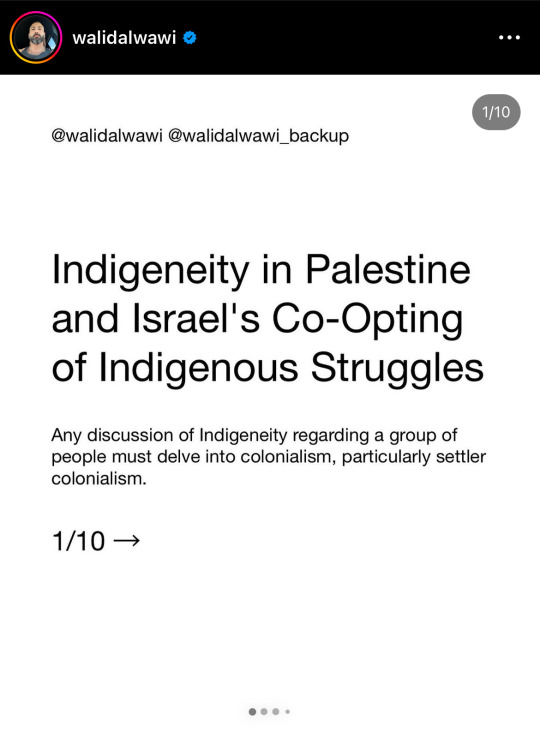
ID 1: All images are screenshots of a post made by walidalwawi on Instagram. They are all of black text on a plain white background. The first image is titled "Indigeneity in Palestine and Israel's Co-Opting of Indigenous Struggles" in large font. The body text, much smaller, reads: "Any discussion of Indigeneity regarding a group of people must delve into colonialism, particularly settler colonialism." Below the body text there is text reading: "1/10", with an arrow pointing left.
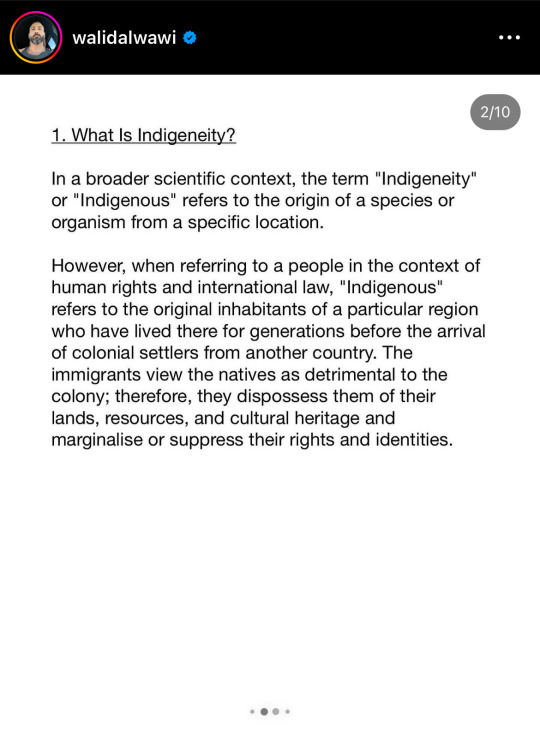
ID 2: The second image is titled: "1. What Is Indigeneity?" in underlined text. The body text reads: "In a broader scientific context, the term 'Indigeneity' or 'Indigenous' refers to the origin of a species or organism from a specific location. However, when referring to a people in the context of human rights and international law, 'Indigenous' refers to the original inhabitants of a particular region who have lived there for generations before the arrival of colonial settlers from another country. The immigrants view the natives as detrimental to the colony; therefore, they dispossess them of their lands, resources, and cultural heritage and marginalise or suppress their rights and identities."
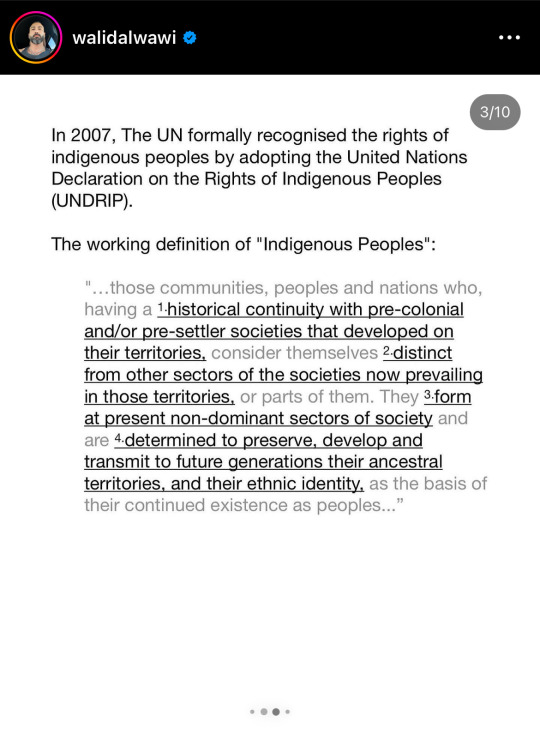
ID 3: The third image reads: "In 2007, The UN formally recognised the rights of indigenous peoples by adopting the United Nations Declaration on the Rights of Indigenous Peoples (UNDRIP). The working definition of 'Indigenous Peoples': '…those communities, peoples and nations who, having a 1. historical continuity with pre-colonial and/or pre-settler societies that developed on their territories, consider themselves 2. distinct from other sectors of the societies now prevailing in those territories, or parts of them. They 3. form at present non-dominant sectors of society and are 4. determined to preserve, develop and transmit to future generations their ancestral territories, and their ethnic identity, as the basis of their continued existence as peoples…'"
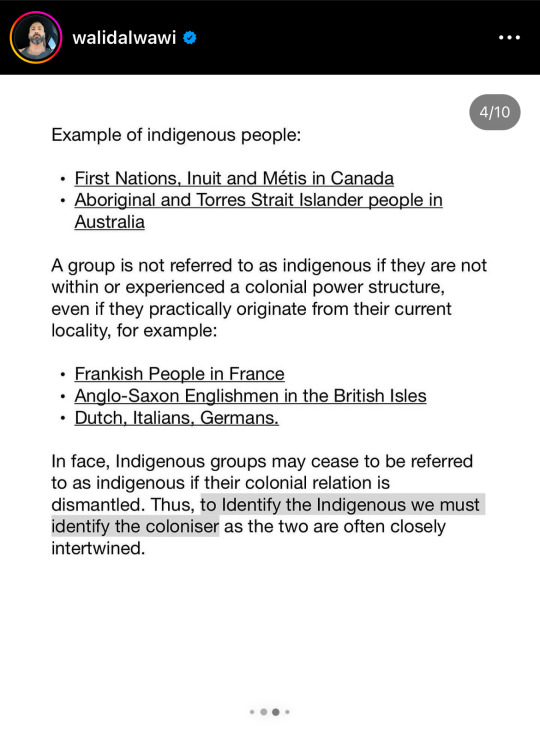
ID 4: The fourth image reads: "Example of indigenous people: - First Nations, Inuit and Métis in Canada - Aboriginal and Torres Strait Islander people in Australia A group is not referred to as indigenous if they are not within or experienced a colonial power structure, even if they practically originate from their current locality, for example:
- Frankish People in France
- Anglo-Saxon Englishmen in the British Isles
- Dutch, Italians, Germans.
In face, Indigenous groups may cease to be referred to as indigenous if their colonial relation is dismantled. Thus, to Identify the Indigenous we must identify the coloniser as the two are often closely intertwined."
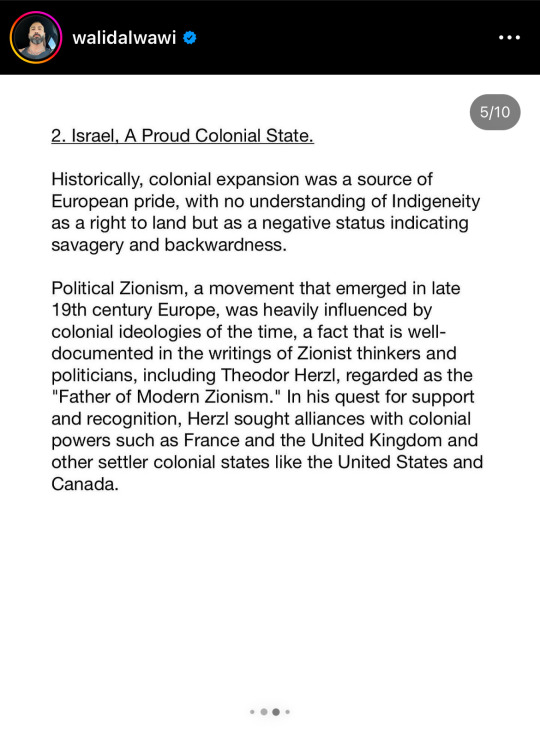
ID 5: The fifth image is titled: "2. Israel, A Proud Colonial State." In underlined text. The body text reads: "Historically, colonial expansion was a source of European pride, with no understanding of Indigeneity as a right to land but as a negative status indicating savagery and backwardness. Political Zionism, a movement that emerged in late 19th century Europe, was heavily influenced by colonial ideologies of the time, a fact that is well- documented in the writings of Zionist thinkers and politicians, including Theodor Herzl, regarded as the 'Father of Modern Zionism.' In his quest for support and recognition, Herzl sought alliances with colonial powers such as France and the United Kingdom and other settler colonial states like the United States and Canada."
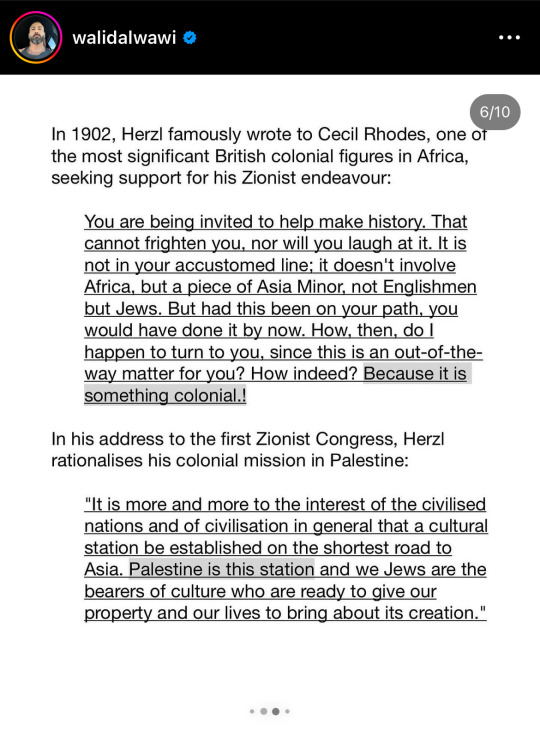
ID 6: The sixth image reads: "In 1902, Herzl famously wrote to Cecil Rhodes, one of the most significant British colonial figures in Africa, seeking support for his Zionist endeavour:". A block quote, all in underlined text, reads: "You are being invited to help make history. That cannot frighten you, nor will you laugh at it. It is not in your accustomed line; it doesn't involve Africa, but a piece of Asia Minor, not Englishmen but Jews. But had this been on your path, you would have done it by now. How, then, do I happen to turn to you, since this is an out-of-the-way matter for you? How indeed? Because it is something colonial.!" Body text continues: "In his address to the first Zionist Congress, Herzl rationalises his colonial mission in Palestine:". Another block quote with underlined text reads: "It is more and more to the interest of the civilised nations and of civilisation in general that a cultural station be established on the shortest road to Asia. Palestine is this station and we Jews are the bearers of culture who are ready to give our property and our lives to bring about its creation."

ID 7: the seventh image reads: "Jabotinsky, a Russian Jewish Zionist leader and founder of the Zionist terrorist organisation Irgun which helped establish israel. Wrote in his book The Iron Wall:". A block quote, all in underlined text, reads: "'Zionist colonisation must either be terminated or carried out against the wishes of the native population. This colonisation can, therefore, be continued and make progress only under the protection of a power independent of the native population an iron wall, which will be in a position to resist the pressure to the native population. This is, in toto, our policy towards the Arabs…' "'If you wish to colonise a land in which people are already living, you must find a garrison for the land, or find a benefactor who will provide a garrison on your behalf…. Zionism is a colonising venture and, therefore, it stands or falls on the question of armed forces.'" Body text continues: "This colonial history is not limited to the past, as we can see it vividly today in israel's colonial practice of daily oppression against the Palestinian natives."

ID 8: The eighth image reads: "Examples of standard methods used by settler colonies to oppress indigenous peoples: a. Land Theft and Dispossession: 1948, upon the establishment of israel, around 700,000 Palestinians were forced to flee or were expelled from their homes by israeli forces 1950, israel established the "Absentee Property Law", which allows the israeli government to seize control of land belonging to Palestinians who fled or were forced to leave during the 1948 war. b. Forced Assimilation: The "Judaization" of Palestinian neighbourhoods by promoting Jewish settlement and adopting Hebrew as the official language in education and public life while restricting Palestinian cultural expression, including banning books, films, and other media that are critical of israeli policies. E.g. The ban of the Palestinian flag in the occupied Gaza Strip and West Bank in 1967 and the prohibition of artworks containing the flag's four colours in 1980. c. Economical Exploitation: israel controls the majority of the water resources in the region as well as exploits Palestinian natural resources, including minerals, quarries, and agricultural land. Palestinian farmers have reported that israeli settlers have uprooted their olive trees, destroyed their crops, and polluted their farmland."
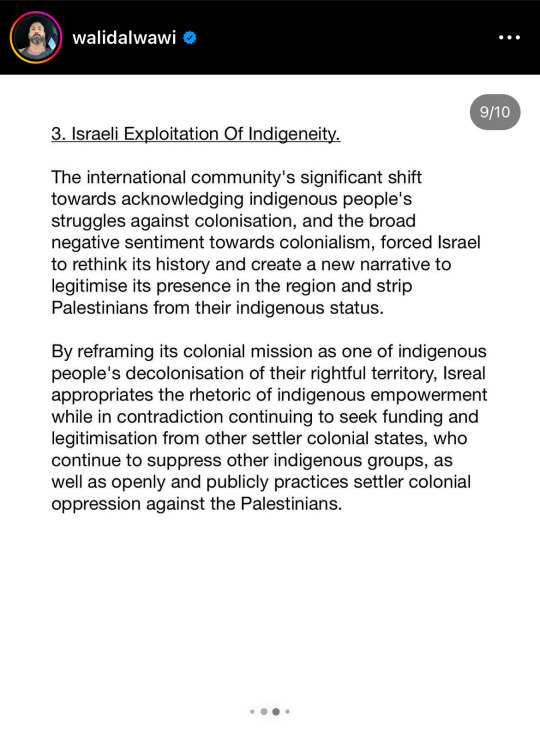
ID 9: The ninth image is titled: "Israeli Exploitation Of Indigeneity." in underlined text. The body text reads: "The international community's significant shift towards acknowledging indigenous people's struggles against colonisation, and the broad negative sentiment towards colonialism, forced israel to rethink its history and create a new narrative to legitimise its presence in the region and strip Palestinians from their indigenous status. By reframing its colonial mission as one of indigenous people's decolonisation of their rightful territory, israel appropriates the rhetoric of indigenous empowerment while in contradiction continuing to seek funding and legitimisation from other settler colonial states, who continue to suppress other indigenous groups, as well as openly and publicly practices settler colonial oppression against the Palestinians."
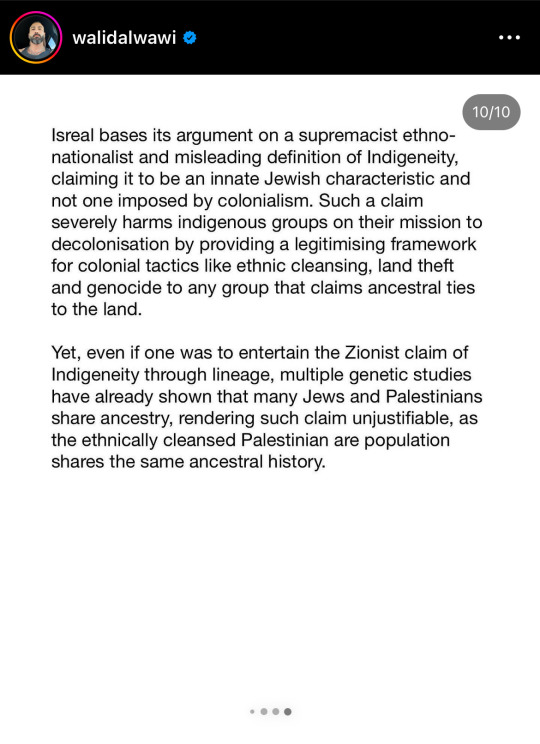
ID 10: The tenth image reads: "israel bases its argument on a supremacist ethno-nationalist and misleading definition of Indigeneity, claiming it to be an innate Jewish characteristic and not one imposed by colonialism. Such a claim severely harms indigenous groups on their mission to decolonisation by providing a legitimising framework for colonial tactics like ethnic cleansing, land theft and genocide to any group that claims ancestral ties to the land. Yet, even if one was to entertain the Zionist claim of Indigeneity through lineage, multiple genetic studies have already shown that many Jews and Palestinians share ancestry, rendering such claim unjustifiable, as the ethnically cleansed Palestinian are population shares the same ancestral history."
58 notes
·
View notes
Note
Hey I just wanted to say thank you so much for your support of the Jewish community, it really means a lot to us (any time, but especially now).
I noticed that you said you're an Indigenous Australian, and I was wondering if there's any ways we can help support you and your community? (Indigenous Australians in general, or your specific nation) I'm not Australian, but I know y'all have definitely suffered discrimination and worse at the hands of the government and society (and still are).
I honestly wasn't expecting thanks. It seemed like the bare minimum, it should be the bare minimum. The fact that it isn't & is rare enough that you felt the need to thank me is more an indictment on the failures of most people in my opinion. I admit, it does feel nice to be thanked though.
If I had donated to multiple Israeli charities I would feel worthy of praise. But the only one I have donated to is Ogen's "Swords of Iron Emergency Economic Relief Fund". I donated about $100USD (they didn't give the option to donate in AUD).
If you still want to help my people than I would suggest donating to the Aboriginal Legal Service (for Aboriginal people needing legal support in NSW & ACT), North Australian Aboriginal Justice Agency, abbreviated as NAAJA (same as the Legal Service but for NT), ALSWA (literally just the Aboriginal Legal Service of Western Australia), The Fred Hollows Foundation (it's owned by white people, but it does good work, & without it the blindness rate for us would be double what it is), or one of the many Aboriginal Medical Services. Each community has their own AMS with their own names (the AMS abbreviation comes from the very first such organisation, AMS Redfern, which is the one you will most likely find if you do a Google search, it serves the Aboriginal community in Sydney, which isn't where I'm from), with widely varying level of effectiveness depending on management. The one servicing people in my area is one of the less effective ones, though most of us rely on it for lack of alternatives.
Once again, most of us can't afford either legal representation or visits to the GP, so donating to an AMS or an aboriginal legal service will help most of the us. I actually have some money, so I don't use the local AMS, instead going to see a GP who mostly services the LGBTQ community.
Calling out antisemites when they are being antisemitic is just the right thing to do. From a moral perspective, letting people victim-blame Israel for the war Hamas started is wrong. Letting people peddle falsehoods & antisemitic libel without calling it out was the same as condoning it. I saw people celebrate the October 7th pogrom outside the Sydney Opera House, long before the Israelis were able to launch counter-attacks on Gaza. I saw people on this site act like Hamas were angels when those murderers bragged & posted the footage of their atrocities for the world to see. I couldn't stay silent as these terrorists were praised after murdering people, raping people, kidnapping people. I couldn't stay silent when people denied these crimes happened despite the overwhelming evidence, despite Hamas not only admitting to it, but proclaiming their desire to do it again & again until there were no more Jews to attack. To stay silent was at best condoning those who would deny what happened.
That alone was enough for me to pick a side, but that's just emotions. If emotions hadn't moved me, my logical side would have still intervened to back Israel & condemn antisemitism.
Defending Israel's right to exist is just basic logical consistency. Even without the moral component of the fact that Hamas committed atrocities on October 7th & are proud of it, I have other principles. Admittingly, some of these started pretty self-serving but applying these principles consistently rather than only when it benefits me leads to altruism, so here we are.
I was going to write the list of principles, but it's a very long list, so that's a separate document. In the meanwhile, I'll summarise two of the parts of the principles list affecting my POV here (though not the only parts, they're the easiest parts to point out).
In essence, I consider the Jewish people to have a better claim to being the native people of Israel/West Bank than the Palestinian Arabs do. I know that some Palestinian Arabs have Jewish ancestry, but I consider indigeneity to be as much about culture as blood, so if they fully adopted the invader's culture & identify as Arabs, they voided any claims to indigeneity they once had as far as I'm concerned. Yeah the first 9 points in the principles list were about native sovereignty. I still think a two-state solution is the best chance for a long-term peace, but that's pragmatism over the fact that the Arabs are there now & aren't going to leave, not an endorsement of their claims to indigeneity.
In addition, I'm a transwoman, not straight (bisexual, not sure where on Kinsey scale) & an atheist. Hamas would kill me if I was somewhere they could reach me for being myself regardless of anything else I did or didn't do. It's just logical to back the side that won't kill me for being a queer non-believer & which actually gives us rights. Actually LGBT rights also made up several more points in the principle lists.
Basically I was locked in to supporting Israel on basic morality & on ideological consistency. I don't see the point in thanking me, but it does feels nice that you did thank me so I guess thanks in return.
#ask response#hi jewishpangolin#antisemitism#i stand with israel#aboriginal australian#aboriginal medical service#ams#lgbt#indigenous#indigeneity#colonialism#arab colonialism#atheist-jewish solidarity#aboriginal legal service#fred hollows foundation
40 notes
·
View notes
Text
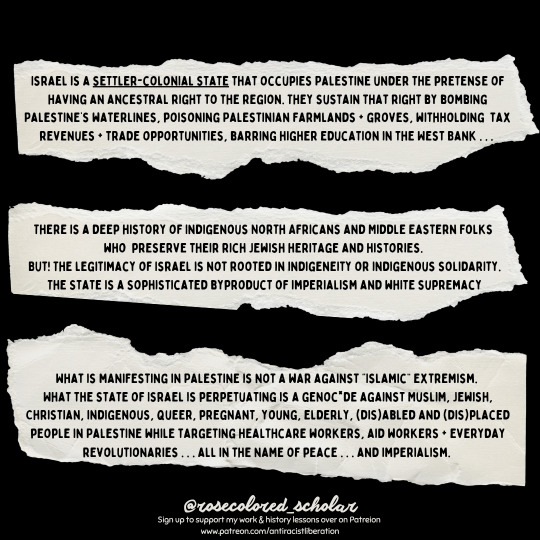
Gentle Reminder that ethnoreligious, ethnicity, and race are (hu)manmade constructs used to legitimize imperial efforts + segregationist practices.
Keep in mind that:
🖤 Indigeneity manifests from rediscovery, decolonized sovereignty, and ancestral the liberation . . . not from settler-colonial, antisemitism of the wild [white] west that sees Black, brown, beige, indigenous, queer, (dis)abled and (dis)placed Jews and MENA folks discriminated and persecuted.
🖤 Manifest Destiny was used to legitimize America’s consolidation and commodification of Indigenous lands, lives, and labor.
🖤 Repatriation + return were the same rhetorics used to justify the colonization of Liberia by free Black People (+ their white benefactors) who perpetuated progressive racism in the United States during the 1810s + 1820s! (put a pin in this)
🖤 Indigenizing Israel has nothing to do with indigenous identities, dismantling the class struggles in our shared world, or winning sovereignty to better steward + sustain ancestral lands to combat climate disaster + capitalism . . . Israel weaponizing indigeneity is an attempt to frame its zionist apartheid as inseparable (+ indistinguishable ) from Judaism + the Jewish Diaspora.
#indigenous sovereignty#indigeneity#our world#ecosystem of white supremacy#rage against imperialism#flowers and freedom for palestine#Settler-colonialism#our history is your history#padawan historian#Israel is an apartheid state
21 notes
·
View notes
Text
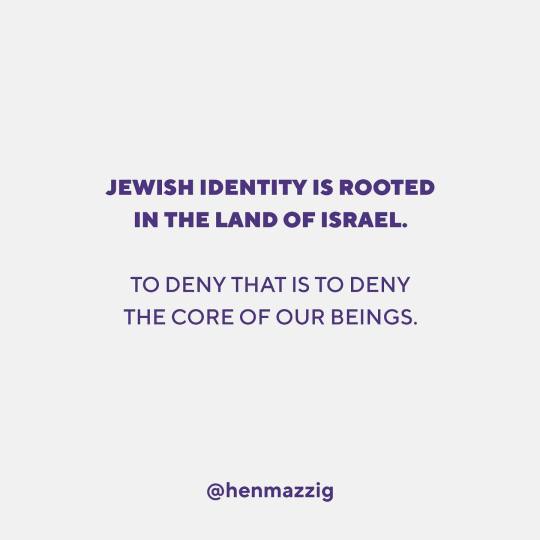
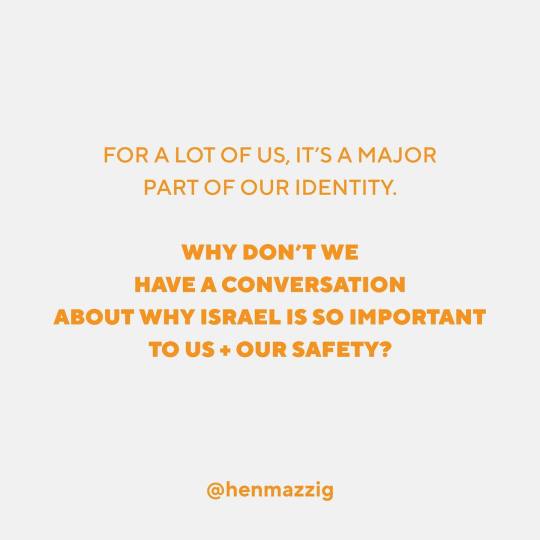
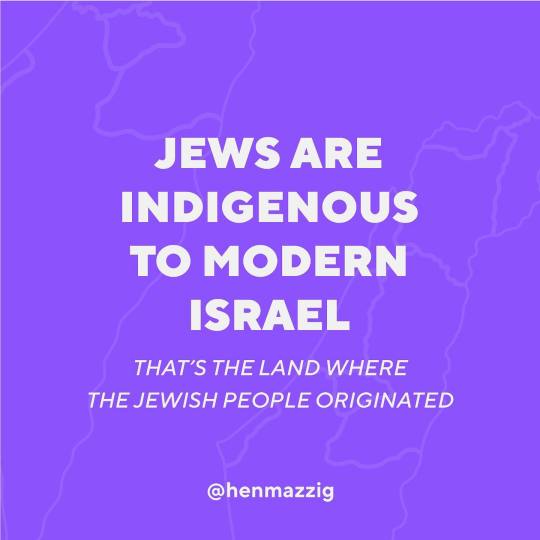


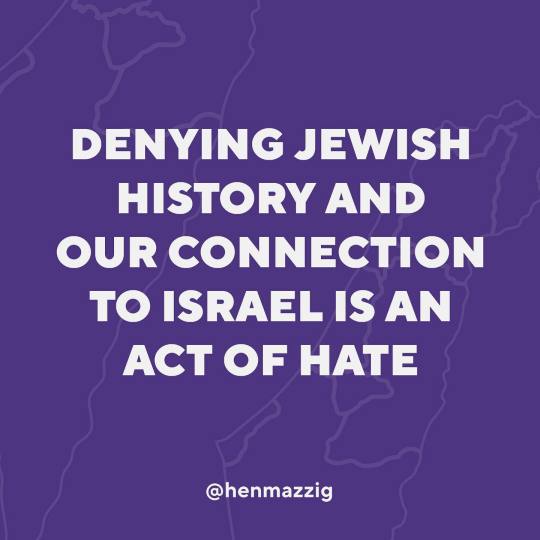
Embracing our roots and reaffirming our connection to our land.
From Jerusalem to the farthest corners of the globe, Jews have carried their identity with them. Today, as discussions on the Israel-Palestinian conflict continue to grow people apart, we delve into the question of indigeneity. Our historical and archaeological journey, spanning millennia, reveals the origins of Judaism in Judea, the land we now call Israel.
Displaced by conquests and dispersion, Jewish people were scattered across the world, leaving our mark in diverse lands from Europe to the Peruvian Amazon. Remarkably, even those who challenge our presence in Israel refer to us as Jews. Notably, even our adversaries like Hamas and Hezbollah acknowledge our right to identify as Jews, or in Arabic, "Yahud" ("Yehuda" meaning Judea).
As the evolving Indigenous rights movement invites nuanced perspectives, some may hesitate to consider us an Indigenous group, irrespective of our geographical history.
In this pivotal moment in history, Jews must reclaim our identity, recognizing ourselves not just as a religious group but as a nation rooted in Israel. This sentiment is what drives the vast majority of Jews worldwide to embrace Zionism and nurture a profound connection to our ancient homeland.
Hen Mazzig
#Jewish#Indigeneity#JewishHeritage#AncientHomeland#Israel#JewishIdentity#Zionism#IndigenousRights#✡️
33 notes
·
View notes
Text
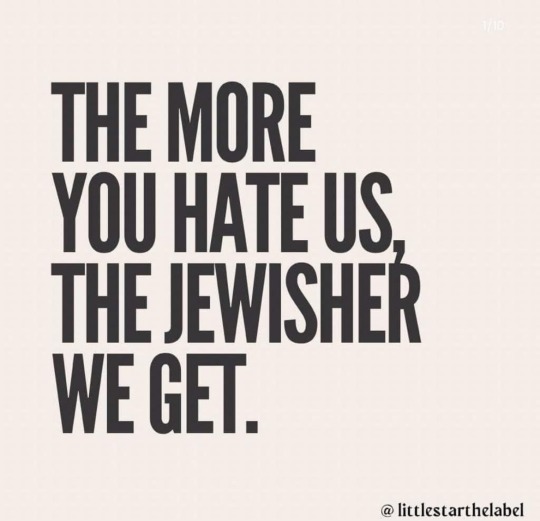
#secular-jew#israel#jewish#judaism#israeli#jerusalem#diaspora#secular jew#secularjew#islam#antisemitism#antisemitic#antisemites#hamas is isis#indigenous#indigeneity#survival#10 7 23#no ceasefire
120 notes
·
View notes
Text
Sooner or later I've gotta make a better post regarding the appropriation of indigenous terminology by proponents of (certain kinds of) Welsh nationalism. But for now here's a very whistle-stop version of that post. I have a degree in Celtic Studies so these topics are very near and dear to my heart.
[Note: I wrote this post originally during a migraine. I'm revisiting the draft while I'm ill but hopefully can fix this up into something somewhat understandable. As always, this is only a very brief description of the history and I strongly reccomend reading about these topics in your own time to develop a deeper understanding of them. These are topics not even well known in Britain, but if you can spend a short time just to read this, you can help to combat misinformation about British (particularly Welsh) history - and that could aid in preventing the misappropriation of history in the long run. Diolch eto for reading!]
Very often, (certain) Welsh nationalists use terminology that positions the Welsh as if they are an 'indigenous' population who have been 'colonised'. They use language (which in this climate) heavily draws upon the language typically used for peoples who are the victims of British colonialism (of which Wales was an active participant). There's multiple issues with this and many of them lie in whether its appropriate to use this language (regardless of its accuracy or not) as a country which was actively involved in the colonisation of much of the world. What I mean in short is that additional language is needed which doesn't step on the toes of endangered cultures and groups directly affected by British colonialism.
Wales not only participated in British colonialism as a whole (alongside Scotland, Ireland* and England) but itself colonised parts of patagonia in Argentina.
I can't think of any similar terminology to 'indigenous' or 'colonised' which would also get the idea which is meant across. 'Native' in certain contexts is permissible, e.g. 'native speaker' in the context of a Welsh speaker. But in other contexts other than langauge, things get tricky when you argue 'nativeness' (this is a topic I will come back to - especially re. Celtic as a language descriptor vs Celtic as a so-called ethnicity). When (certain) Welsh nationalists talk about being 'indigenous' , being 'native' or 'colonised' what is meant by that?

(Map of the expansion of the Bronze Age Bell Beaker culture circa 2400 BC in Britain and Ireland) - from this map
What makes a Welsh person 'indigenous' to this island that doesn't immediately disqualify other peoples who also have a deep history here? Historically, the island of Britain has been lived on by many, many peoples.
In the Bronze Age you had the arrival of the Bell Beaker people. Then in the Iron-Age, you had tribes speaking (mostly) Brittonic. I say mostly, because we have direct evidence that in the Iron Age Gaulish speaking tribes also moved to parts of Britain but later became integrated with the rest of the population (which, I will add, were not a united peoples but a scattering of different groups who often went to war against each other). Then the Romans invaded Britain (and much of Western Europe) and over time integrated into the local population. So now Britain is Romano-British. Eventually the Western Roman Empire collapses and Britain enters into the sub-Roman Britain phase of its existence. Kingdoms begin to form, with the population speaking Brittonic and British-Latin. So you have different kingdoms in (what would become Wales) and in (what would become Northern England and Southern Scotland) you have more Brittonic-speaking kingdoms.
These kingdoms were also not a united peoples. They shared a language - but it's like claiming that Ancient Greeks were a united people simply because they all spoke Greek. Sparta, Athens, Cornith etc. were independent of each other and the same is true of the kingdoms of the Hen Ogledd (the Old North) and the kingdoms of Wales. They all had a common language but also went to war with each other sometimes. Eventually, the Brittonic language began to diverge into different languages. Namely, Old Welsh and Cumbric (the language spoken in what is today Cumbria, Lancashire, Northumberland and Southern Scotland). The two languages were still very closely related but had diverged by a certain point.
At the same time this is happening, Anglo-Saxons begin to arrive in what is now Kent. They form kingdoms and the Britons living there are either displaced or become absorbed into the Anglo-Saxon populace. Then the Norse rock up and conduct viking raids around the coast before finally settling in parts of the country and forming their own territories.
So now Britain has several groups living on the island (keeping in mind even before settlement from the Anglo-Saxons and the Norse that the British kingdoms were already composed of different groups themselves). Northern Scotland was also having a time re: Picts, Gaels and Britons - but we'll gloss over that for brevity. Also, Ireland was also raiding the Welsh coast at this time too.
Then the Normans rock up and in 1066 William the Conqueror, well, conquers. More history happens after this point but I will try and keep this as brief and as non-messy as I can.
So, to recap:
One of the earliest cultures in Britain was the Bell Beaker people in the Bronze Age. They had their lands settled by the Iron Age Britons ('Celts'). Then the Romans came and the 'Celts' became Romano-Britons. After the Western Roman Empire collapses the remaining population forms kingdoms with distinct political identities. These kingdoms eventually find themselves fighting the Anglo-Saxons and the Norse. Then the Normans turn up and so on and so forth.
So- which group is the original native group to Britain? (Trick question - this question cannot be satisfactorily answered in favour of one group without leaning into claims of historicity which the other groups can also claim).
Which brings me to modern Welsh identity and those who came before.
Something I see in Welsh nationalist groups is a claim to the legacy (or even claims of direct descendance from) the Iron Age Britons (commonly called Celts for shorthand, but as I said before I'm gonna get back to that point). And this narrative is what the "Welsh people are native to Britain" argument is based off of.
It may seem like #praxis to argue the Welsh people are the true inhabitants of Britain and the English are evil invaders. But you have to make *several* logical leaps to get to that point if you're genuinely arguing that point.
For starters, many more people than just the Britons (read: Romano Britons/early Brittonic kingdoms) have called Britain home since the Early Middle Ages. For example, there's the settlement of Scotland by the Gaels, the Irish settlement of certain parts of costal Wales. You have (much later) Roma and traveller groups, Jewish diaspora and many more diverse cultures and peoples existing in Britain at this time. The Romano-British population, which developed into the Early Middle Ages kingdoms of Wales and the Hen Ogledd, was also multicultural. Many black Romans started families with white Britons. By the sub-Roman period, Britain was ethnically and culturally diverse.
But those who argue in favour of a such thing as 'Celtic ethnicity' in order to support the idea Britons (and only Britons) were native to these islands typically imagine that history as white. White Brits, white Romans, white Gaels. When we know this isn't true. Did you know that the Northernmost Ancient Egyptian temple in the world is in Yorkshire because Roman Egyptians in the military brought their religion with them? Mary Beard did a fantastic documentary about a Roman Soldier from modern day Syria who was stationed at Hadrian's Wall who started a family with a British woman. Point is, that some people like to imagine a purely white Britain that they can pine for. And I'm afraid it simply isn't true. The version of history many white supremacists look to simply didn't exist.
I'll quickly bring up one last point before I draw this to a close. And it's about Celtic as a linguistic term vs Celtic as a so-called ethnicity. You see, any first year Celtic Student would tell you that there is no such thing as 'Celts'. Crazy, I know from people studying *Celtic* studies. But hear me out - there is good reasoning why (beyond language groups) Celtic is not a good term for describing an ethnic group. Much of it relates to what I've already mentioned, but we categorise Ireland, Scotland, Wales, Mann, Cornwall and Brittany as Celtic not because of the ethnicity of the people living there (which I've mentioned is pretty diverse) but because they are all places where Celtic languages are spoken. It wasn't until Edward Llwyd (d. 1709) that the term Celtic was coined to describe these languages. Up until that point, nobody was thinking of Irish and Welsh as related because the languages do not sound like they have a common origin. By extension, people didn't think of the Welsh and Irish as being the same peoples (or Celtic) either. Its only in the modern day there is a sense of Celtic identity. The Iron Age Britons were not going around calling themselves Celts. There was no common Celtic identity. But very often people argue Celticness based on a pseudohistory which insists on a false and misleading interpretation of history. Whether or not Celticness exists now is a different matter entirely. But it sure does not rest upon race or ethnicity as a qualifier. This is quite foundational stuff to first year and above Celtic Scholars, but is not generally well known outside of academia because the misinformation is quite strong. So if you read is far, diolch mawr and please share this with anyone you think might be interested in it. Any amount of knowledge of these things would greatly improve understanding of what it means to be Welsh and what it means to speak a Celtic language.
Lastly,
all of that begs us to ask the question:
What does it mean to claim nativeness in a Western European context?
More under the cut
What does it mean to claim nativeness in a Western European context? Especially in a Western Europe post-colonialism.
It means, to me, to claim what isn't our right to claim. To argue and make our points with language that isn't ours and isn't designed to be ours. That this language of indigeneity may sound appealing, but is it improper to use this terminology when our country was directly responsible for the atrocities in which this very language became relevant?
What do we do in response to the misinterpretation of our culture instead of relying on language of indigeneity? These are the questions I want to leave you with and invite you to share your thoughts on. How do we build a Wales which advocates for itself without relying upon inaccurate language which betrays a reliance upon the ahistorical to make its point?
What kind of Wales do we want to live in?
#cymraeg#welsh#cymru#cymry#cymblr#Wales#welsh language#welsh nationalism#nationalism#indigeneity#?#white supremacist mention#white nationalism cw#please add on if you have any thoughts on the matter - I'd love to hear other's takes on the topic!#this post was also mostly made when I was ill/had a migraine so it may not be perfect#but gets most of what I want across well enough I think
101 notes
·
View notes
Text
A happy "Go Fuck Yourself" to anyone who denies Palestinian indigeneity to the land, who peddle the lie that Palestinians descend from Arab conquerors and thus supposedly aren't indigenous. You know nothing.
11 notes
·
View notes
Text
Yek tanestuk amehemet, I have good news!
I will be teaching an Indigenous language starting in the summer this year!!

More details:
What is Nawat?
Nawat (sometimes spelled Náhuat) is an Indigenous language native to the western half of Guxgatan, what is now called El Salvador.
Why teach it?
Unfortunately, due to colonization the language only now has around 50 native speakers in El Salvador. We would like to help share it with the Salvadorean diaspora and publish things like books, plays, music, and more in order to revitalize our language.
Where is it being taught?
There are many places in El Salvador that teach Nawat, however most of these places are run by the government and use colonial sources that don't accurately reflect the way Nawat is spoken in Indigenous communities.
ANIS, the national association of Indigenous Salvadoreans, has initiated a school called Xućigisa An Ne Náwat and employs actual native speakers who live in Indigenous communities to teach the language and culture, as well as Indigenous values and worldview. On occasion, we also offer elective classes with the subject of Indigenous queerness, traditional medicine, embroidery/weaving, and singing.
The language classes are easy for both English and Spanish speakers, but the elective classes tend to be Spanish based only.
Unlike most government run Nawat classes, Xućigisa An Ne Náwat is also a queer and trans focused community, with our queerness being an inherent part of our Indigenous culture and identity.
If you are of the Salvadorean diaspora and are interested in reconnecting with our Indigenous roots, please consider reaching out to sign up for classes with ANIS, I will also be making updates when enrollment is actively available year round. Tuition is based on what you can give and can be as low as $10 per month, all tuition is so that we can support the Indigenous teachers who currently live in poverty.
If you are not Salvadorean or just don't have an interest in taking classes, please still consider donating to help us create more resources in order to keep our language alive.
Anyone is free to send me an ask or DM about further information.
Sujsul padiux !!
#nawat#náhuat#language revitalization#language revival#xućigisa an ne nawat#signal boost#the art is mine#my art#kar's art#salvadorean art#el salvador#indigenous languages#indigenous art#indigeneity
9 notes
·
View notes